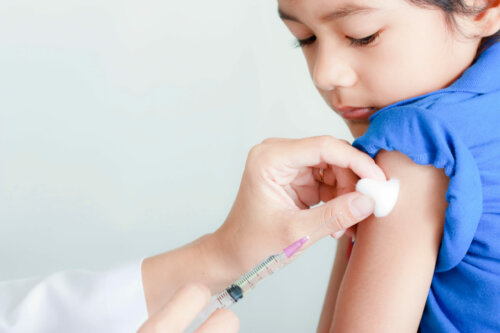Oral Immunotherapy for Children Who Are Allergic to Peanuts

Peanut allergy isn’t only one of the most frequent allergies in children, it’s also one of the most feared. There’s a high risk of respiratory arrest and death, so children’s relatives avoid contact with peanuts at all costs. For this reason, specialists are working to solve this dangerous allergy by investigating oral immunotherapy for children who are allergic to peanuts.
A recent study offers promising advances in the cure for peanut allergy, thus improving the quality of life of children and their families.
Stay tuned to this blog to be updated on the results of this study in preschool children, to know what to monitor, and to learn whether it’s appropriate or not for all children.
A study with encouraging results
The conventional treatment of peanut allergy is avoidance of the food and management of symptoms when they manifest. However, this strategy isn’t as practical for young children, as they’re not able to avoid possible peanut contamination in the environments they frequent.
Moreover, avoidance doesn’t solve the risk of developing an anaphylactic reaction in children. So, they remain very vulnerable even in everyday environments.
This is why another effective strategy for the treatment of peanut allergy is being investigated, called oral immunotherapy (OIT), which consists of administering small amounts of peanut protein to allergic children. The ultimate goal is to desensitize their immune system when in the presence of this nut.

What did the study involve?
Soller’s Canadian team sparked hope when, in 2010, they published the results of their work in The Journal of Allergy and Clinical Immunology: In Practice. The aim of this study was to evaluate the efficacy of oral immunotherapy in preschool-aged children within their natural environment after 1 year of maintenance.
This evaluation involved 117 children between 9 months and almost 6 years of age who showed at least 1 positive reaction to peanuts or who, based on blood tests, had a suspected peanut allergy.
These children attended the testing clinic 8 to 11 times and received a 300-milligram dose (1 peanut) to aid desensitization at each visit.
This dose was maintained for 1 year and after this time, they tested with a cumulative dose of 4000 milligrams (13 units) of peanut protein to see how they reacted.
What were the results of the study?
The most important finding of this study was that 78.6% of all the children studied were able to ingest 4000 milligrams of peanut protein without reacting. Those who reacted had mild to moderate symptoms. Only 1 participant required emergency therapy.
Furthermore, 98% of the children studied were able to tolerate a dose equal to or greater than 1000 milligrams (3 units), which is enough to consider them protected against accidental exposure in their daily lives.
These results also led to the conclusion that oral immunotherapy could desensitize peanut-allergic preschool children. Therefore, it’s possible to consider it as an alternative therapy to the current peanut avoidance recommendations.
You may be thinking that the headache for everyone at home has been solved, as the cure for peanut allergy may have been found. However, there are a few things to keep in mind.
What should we watch out for in oral immunotherapy?
When deciding with the medical staff if it’s convenient to apply it to our children, we have to scrutinize between the “good” and the “not so good” aspects of this therapy.
The good thing about oral immunotherapy is that it can eliminate the risk of a severe allergic reaction from accidental consumption of peanuts in our children.
In addition, it can improve the quality of life of the child and the family by allowing them to participate in social activities that previously could cause fear due to possible reactions to peanut ingestion.
What’s “not so good” about oral immunotherapy?
This is a type of treatment that requires a lot of discipline and commitment from the participants and family members. For example, frequent visits to the medical staff and a willingness to take the recommended dosage are part of the success of the treatment. It’s worth mentioning that this method can’t be performed at home and requires professional monitoring in a properly prepared place, such as a hospital.
An article in the journal Allergy and Asthma Proceedings in 2021, clarifies that the application of the treatment may generate anxiety in the child or family members due to the fear of serious reactions.
On the other hand, Dunlop’s paper in the journal BMJ Journals in 2020 reveals that one of the side effects of oral immunotherapy is the occurrence of acute allergic reactions related to the amounts to be administered.
For best results, family members need to be confident with the treatment and in this regard, the U.S. Food and Drug Administration (FDA) approved a vaccine for peanut allergy. We’ll discuss it below.

FDA’s peanut allergy vaccine
Peanut allergy treatment took a leap again in 2020, when the FDA approved the first vaccine for this allergy, known as “Palforzia.” Similar to oral immunotherapy (P-OIT), “Palforzia” uses small doses of peanut protein to gradually desensitize the patient’s immune system.
It’s given to children and youth ages 4-17 with a confirmed diagnosis of peanut allergy. However, while it’s a promising development, more research is needed to determine its long-term effectiveness compared to P-OIT.
Is OIT only for peanuts?
No, oral immunotherapy is also being investigated for other food allergies. For example, studies are being conducted regarding cow’s milk, eggs, and wheat protein. So far, therapeutic efficacy has only been found for egg protein. This was reported in an article published in the World Allergy Organization Journal in 2020.
Can oral immunotherapy be applied to children who are allergic to peanuts?
Before acting, you should seek the professional support of an allergist and a pediatrician, who will help decide when and how to apply oral immunotherapy. The application protocol will depend on their recommendations.
So far, it’s a good option to reduce the risks of anaphylaxis and other serious symptoms, as it helps to desensitize the immune system and improve the quality of life of our children. Remember, you need professional guidance!
Peanut allergy isn’t only one of the most frequent allergies in children, it’s also one of the most feared. There’s a high risk of respiratory arrest and death, so children’s relatives avoid contact with peanuts at all costs. For this reason, specialists are working to solve this dangerous allergy by investigating oral immunotherapy for children who are allergic to peanuts.
A recent study offers promising advances in the cure for peanut allergy, thus improving the quality of life of children and their families.
Stay tuned to this blog to be updated on the results of this study in preschool children, to know what to monitor, and to learn whether it’s appropriate or not for all children.
A study with encouraging results
The conventional treatment of peanut allergy is avoidance of the food and management of symptoms when they manifest. However, this strategy isn’t as practical for young children, as they’re not able to avoid possible peanut contamination in the environments they frequent.
Moreover, avoidance doesn’t solve the risk of developing an anaphylactic reaction in children. So, they remain very vulnerable even in everyday environments.
This is why another effective strategy for the treatment of peanut allergy is being investigated, called oral immunotherapy (OIT), which consists of administering small amounts of peanut protein to allergic children. The ultimate goal is to desensitize their immune system when in the presence of this nut.

What did the study involve?
Soller’s Canadian team sparked hope when, in 2010, they published the results of their work in The Journal of Allergy and Clinical Immunology: In Practice. The aim of this study was to evaluate the efficacy of oral immunotherapy in preschool-aged children within their natural environment after 1 year of maintenance.
This evaluation involved 117 children between 9 months and almost 6 years of age who showed at least 1 positive reaction to peanuts or who, based on blood tests, had a suspected peanut allergy.
These children attended the testing clinic 8 to 11 times and received a 300-milligram dose (1 peanut) to aid desensitization at each visit.
This dose was maintained for 1 year and after this time, they tested with a cumulative dose of 4000 milligrams (13 units) of peanut protein to see how they reacted.
What were the results of the study?
The most important finding of this study was that 78.6% of all the children studied were able to ingest 4000 milligrams of peanut protein without reacting. Those who reacted had mild to moderate symptoms. Only 1 participant required emergency therapy.
Furthermore, 98% of the children studied were able to tolerate a dose equal to or greater than 1000 milligrams (3 units), which is enough to consider them protected against accidental exposure in their daily lives.
These results also led to the conclusion that oral immunotherapy could desensitize peanut-allergic preschool children. Therefore, it’s possible to consider it as an alternative therapy to the current peanut avoidance recommendations.
You may be thinking that the headache for everyone at home has been solved, as the cure for peanut allergy may have been found. However, there are a few things to keep in mind.
What should we watch out for in oral immunotherapy?
When deciding with the medical staff if it’s convenient to apply it to our children, we have to scrutinize between the “good” and the “not so good” aspects of this therapy.
The good thing about oral immunotherapy is that it can eliminate the risk of a severe allergic reaction from accidental consumption of peanuts in our children.
In addition, it can improve the quality of life of the child and the family by allowing them to participate in social activities that previously could cause fear due to possible reactions to peanut ingestion.
What’s “not so good” about oral immunotherapy?
This is a type of treatment that requires a lot of discipline and commitment from the participants and family members. For example, frequent visits to the medical staff and a willingness to take the recommended dosage are part of the success of the treatment. It’s worth mentioning that this method can’t be performed at home and requires professional monitoring in a properly prepared place, such as a hospital.
An article in the journal Allergy and Asthma Proceedings in 2021, clarifies that the application of the treatment may generate anxiety in the child or family members due to the fear of serious reactions.
On the other hand, Dunlop’s paper in the journal BMJ Journals in 2020 reveals that one of the side effects of oral immunotherapy is the occurrence of acute allergic reactions related to the amounts to be administered.
For best results, family members need to be confident with the treatment and in this regard, the U.S. Food and Drug Administration (FDA) approved a vaccine for peanut allergy. We’ll discuss it below.

FDA’s peanut allergy vaccine
Peanut allergy treatment took a leap again in 2020, when the FDA approved the first vaccine for this allergy, known as “Palforzia.” Similar to oral immunotherapy (P-OIT), “Palforzia” uses small doses of peanut protein to gradually desensitize the patient’s immune system.
It’s given to children and youth ages 4-17 with a confirmed diagnosis of peanut allergy. However, while it’s a promising development, more research is needed to determine its long-term effectiveness compared to P-OIT.
Is OIT only for peanuts?
No, oral immunotherapy is also being investigated for other food allergies. For example, studies are being conducted regarding cow’s milk, eggs, and wheat protein. So far, therapeutic efficacy has only been found for egg protein. This was reported in an article published in the World Allergy Organization Journal in 2020.
Can oral immunotherapy be applied to children who are allergic to peanuts?
Before acting, you should seek the professional support of an allergist and a pediatrician, who will help decide when and how to apply oral immunotherapy. The application protocol will depend on their recommendations.
So far, it’s a good option to reduce the risks of anaphylaxis and other serious symptoms, as it helps to desensitize the immune system and improve the quality of life of our children. Remember, you need professional guidance!
All cited sources were thoroughly reviewed by our team to ensure their quality, reliability, currency, and validity. The bibliography of this article was considered reliable and of academic or scientific accuracy.
- Anagnostou A. (2021). Weighing the benefits and risks of oral immunotherapy in clinical practice. Allergy and asthma proceedings, 42(2), 118–123. https://doi.org/10.2500/aap.2021.42.200107
- Dunlop JH. Oral immunotherapy for treatment of peanut allergy. Journal of Investigative Medicine 2020;68:1152-1155. Disponible en: https://jim.bmj.com/content/68/6/1152
- Ogura, K., Yanagida, N., Sato, S., Imai, T., Ito, K., Kando, N., Ikeda, M., Shibata, R., Murakami, Y., Fujisawa, T., Nagao, M., Kawamoto, N., Kondo, N., Urisu, A., Tsuge, I., Kondo, Y., Sugai, K., Uchida, O., Urashima, M., Taniguchi, M., … Ebisawa, M. (2020). Evaluation of oral immunotherapy efficacy and safety by maintenance dose dependency: A multicenter randomized study. The World Allergy Organization journal, 13(10), 100463. Disponible en: https://doi.org/10.1016/j.waojou.2020.100463
- Soller, L., Abrams, E. M., Carr, S., Kapur, S., Rex, G. A., Leo, S., McHenry, M., Vander Leek, T. K., Yeung, J., Cook, V. E., Wong, T., Hildebrand, K. J., Mak, R., Gerstner, T. V., Cameron, S. B., & Chan, E. S. (2021). First Real-World Effectiveness Analysis of Preschool Peanut Oral Immunotherapy. The journal of allergy and clinical immunology. In practice, 9(3), 1349–1356.e1. https://doi.org/10.1016/j.jaip.2020.10.045
- U.S. Food & Drug. FDA approves first drug for treatment of peanut allergy for children. Actualizado: 31 de enero, 2020. Disponible en: https://www.fda.gov/news-events/press-announcements/fda-approves-first-drug-treatment-peanut-allergy-children#:~:text=Treatment%20with%20Palforzia%20may%20be,avoid%20peanuts%20in%20their%20diets.
This text is provided for informational purposes only and does not replace consultation with a professional. If in doubt, consult your specialist.








